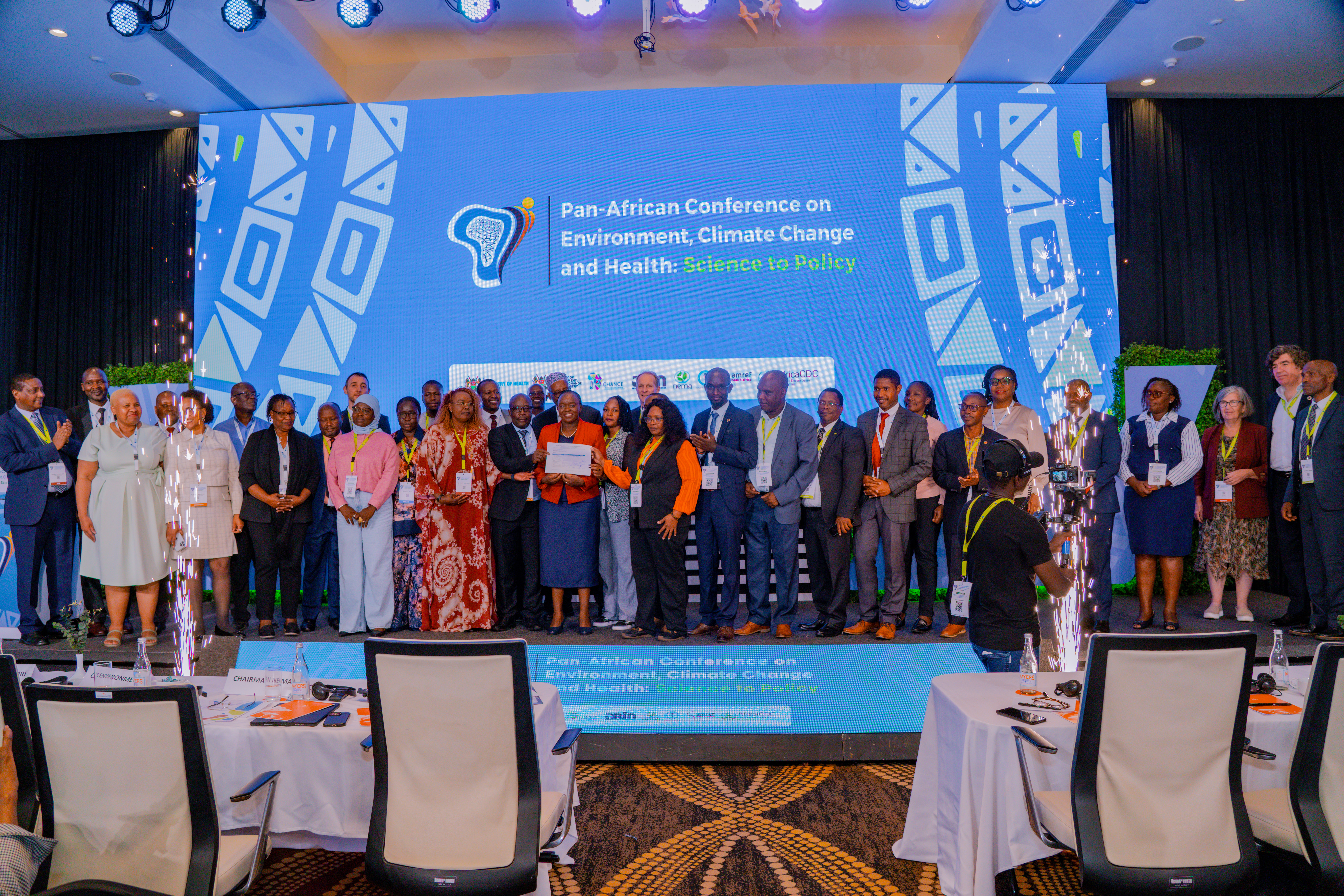Curtains came down on a successful 4th Pan-African Conference on Environment, Climate Change and Health in Nairobi with a clarion call to create a nexus between environment, climate change and health as a critical link to solve the planetary crisis.
The conference was held under the theme “Harnessing Science, Policy, and Partnerships for Environmental Sustainability and Climate-Health Resilience,”. It offered a holistic platform for countries to share ongoing actions, progress, and challenges in addressing the climate–health nexus.
The conference brought together over 500 delegates including scientists, policymakers, health professionals, environmental experts, civil society, youth, and development partners from across Africa and beyond, who called for stronger collaborative networks to strengthen integrated solutions, accelerate financing, and promote knowledge co-production and sustained impact, under the unifying banner, “One Africa – One Environment – One Climate – One Health.”
The four-day conference provides a vital platform for Africa to champion fair climate financing, equitable technology transfer and stronger local research capacity, ensuring our continent’s priorities shape the global climate–health agenda.
The event was officially opened by the cabinet secretary for Health Hon. Aden Duale and closed by the Cabinet Secretary for Environment, Climate Change and Forestry, Dr. Deborah Baraza. The two CS emphasized the need to integrate environmental health into all sectors, from agriculture and education to healthcare and urban planning, while investing in innovation and community-led strategies to strengthen resilience and promote equity.
According to CS Aden Duale, the conference marked a symbolic handover of the baton of stewardship to Kenya, reaffirming Africa’s shared commitment to advancing the climate–health agenda and amplifying a unified continental voice in global negotiations. He added that, “We take pride in launching two landmark frameworks; the Kenya Climate Change and Health Strategy (2024–2029) and the Kenya Household Air Pollution Prevention Strategy (2024–2029), aimed at strengthening climate-resilient health systems and safeguarding vulnerable communities”
“A healthy planet is the foundation of healthy people,” Dr. Mulongo noted. “We must ensure that environmental health considerations are embedded in every policy and sectoral plan. Only through collaboration, innovation, and community-driven solutions can we build a truly resilient and equitable future.”
Reaffirming Kenya’s commitment, Dr. Baraza in her remarks highlighted ongoing initiatives such as the 15B tree campaign, clean energy programmes, and climate resilient community projects. She expressed confidence that Africa can lead the world toward a greener, healthier, and more sustainable future, a sentiment echoed throughout the conference deliberations.
Speaking during the launch ceremony, the NEMA Director General, Dr. Mamo B. Mamo, EBS stated that NEMA as the lead agency responsible for coordinating and supervising environmental matters in Kenya, continues to play a central role in promoting sustainable environmental management. Dr. Mamo said that agencies in the environment, climate change and health have been working in silos, an approach that has proved ineffective. He noted that it is important to rally the public behind environmental and climate action initiatives, ensuring that no one is left behind in the journey toward sustainable development.
He underscored the importance of strong partnerships between the public and private sectors in driving the environmental management agenda. He also called on the public to actively participate in environmental activities such as community clean-ups and tree planting. The conference concluded with a Pan-African Call to Action , urging all African nations to rise in unity and build a resilient, healthy, and sustainable continent through enhanced leadership in Health, Environment, and Climate Action (HECA
NEMA Chairman, Emilio Mugo stated that the conference offered a platform for Africa, where funding for research is often constrained and scientific publications remain inaccessible to many policymakers to work together to enhance scientific research particularly on environment. “The conference such as this provide an invaluable platform for sharing scientific insights, building professional networks, and enhancing access to data that can guide evidence-based policy and regulatory decisions,” he stated.
He remarked that NEMA in recognition of the critical role of research in guiding sound environmental management, the board has established and empowered department of Research to collect and analyze scientific evidence to inform environmental policy formulation, in line with NEMA’s mandate under the Environmental Management and Coordination Act (EMCA).
Despite notable progress, delegates acknowledged persistent challenges. Frameworks and networks aimed at increasing motivation around climate and health solutions remain fragmented and inadequately anchored in collaborative, transformative practice. Implementable solutions at the national and local levels are still scarce, underfunded, and unevenly distributed. Participants stressed the need to strengthen localized action and better link global and regional ambitions with national and community-level implementation.
The conference culminated in a tree-planting exercise at St. Mary’s hospital, Langata, symbolizing a shared commitment to environmental stewardship. This was followed by community engagement activities in Laini Saba, Kibera, where delegates interacted with Weather Mtaani, a local youth-led group that helps residents interpret weather forecasts and prepare for climate-related health risks such as water contamination and flooding. The group also organizes regular clean-up drives to clear drainage channels and improve water flow within the informal settlement. By using Swahili and Sheng to communicate, Weather Mtaani makes climate and health information relatable, accessible, and actionable for the local community.
The conference was co – convened by KEMRI, MoH, Ministry of Environment, Climate Change & Forestry, Africa Research & Impact Network (ARIN), National Environment Management Authority (NEMA), AMREF Health Africa, The Aga Khan University Institute for Human Development, CHANCE Network and the Africa CDC.




